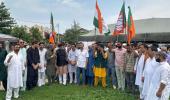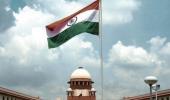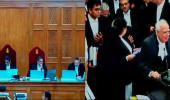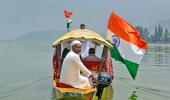The Supreme Court said on Thursday the surrender of Jammu and Kashmir's sovereignty to India was "absolutely complete" with the accession of the former princely state in October 1947, and it was "really difficult" to say that Article 370 of the Constitution, which accorded special status to the erstwhile state, was permanent in nature.

Observing that once Article 1 of the Constitution says India shall be a Union of States, including Jammu and Kashmir, the transfer of sovereignty was complete in all respects, a five-judge Constitution bench headed by Chief Justice DY Chandrachud said.
Schedule 1 of the Indian Constitution contains the list of states and Union territories and their extent and territorial jurisdiction, and Jammu and Kashmir figures there in the list.
The bench, also comprising Justices Sanjay Kishan Kaul, Sanjiv Khanna, BR Gavai and Surya Kant, observed it cannot be said that some elements of sovereignty in Jammu and Kashmir were retained post Article 370.
"One thing is very clear that there was no conditional surrender of sovereignty of Jammu and Kashmir with India. The surrender of sovereignty was absolutely complete. Once sovereignty was absolutely vested in India, the only restraint was on the power of Parliament to enact laws (in respect of the state)," the CJI said.
"We cannot read the post Article 370 Constitution as a document which retains some element of sovereignty in Jammu and Kashmir," he said.
The argument of the petitioners, who have challenged the abrogation of Article 370, is that under the Instrument of Accession the Government of India was empowered to look after only defence, communication and external affairs.
Senior advocate Zaffar Shah, appearing for the Jammu and Kashmir High Court Bar Association, one of the petitioners, said constitutionally speaking, there is no power vested in the central government or in the President to make any laws for the erstwhile state.
Shah, who was arguing on the fifth day of hearing in the matter, said unlike Jammu and Kashmir, neither consultation nor concurrence was required for framing of laws with regard to other states.
"The constitutional autonomy of the state is embedded in Article 370," he asserted.
Justice Kaul said the real issue is whether the process adopted by the Centre for abrogating Article 370 was permissible or not.
"To say that Article 370 is permanent is really difficult. Suppose the state itself says that we want all laws (prevailing elsewhere in the country) to apply, then where does Article 370 go? Then, we really come back to the main question of process (where Parliament can repeal Article 370). Was this process permissible or not?" Justice Kaul asked Shah.
The senior counsel replied there may be different perceptions on the issue and the question would be whether Article 370 was temporary or became permanent as the constituent assembly was not there to remove it on August 5, 2019.
The petitioners have repeatedly said the constituent assembly of Jammu and Kashmir alone could have recommended the abrogation of Article 370 and, since it ceased to exist after drafting the state constitution in 1957, the provision acquired a permanent status. They have maintained that Parliament arrogated to itself the power of abrogating the constitutional provision, an act that was unconstitutional.
"If that machinery (constituent assembly) was to be recreated, then Article 370 could be removed?" Justice Kaul asked.
The senior lawyer said for complete integration of Jammu and Kashmir with India, one had to get rid of the instrument of accession signed on October 26, 1947, as well as Article 370, and execute a merger agreement.
Shah wondered whether one can proceed on an assumption that the constituent assembly of Jammu and Kashmir would have recommended to the Union of India the abrogation of Article 370 so it "completely integrates" with the country.
Justice Khanna voiced his reservations on the use of the term "completely integrates", saying the integration had already taken place as per Article 1 of the Constitution.
CJI Chandrachud said though there are restraints on the power of Parliament to make laws for states on subjects falling in the state list, the distribution of legislative powers does not affect the fact that the sovereignty vests in India.
"Restraint on the power to enact legislation is implicit in the scheme of the Constitution because we don't have a unitary State. But does that retract from sovereignty? No. It's just a fetter on Parliament," the CJI said, adding that concurrence is not something unique only with regard to the country's relationship with Jammu and Kashmir.
He said there are various shades of concurrence required under the Constitution and they don't reflect on the sovereignty of the Union.
Referring to Article 246 A, which relates to Goods and Services Tax, the CJI said this is a classic case where the Union of India or Parliament can do nothing without the concurrence of states.
"Article 246A has completely redefined our notions of sovereignty as states are given a vital role in financial matters," he told Shah, adding, "Our notion of parliamentary exclusion from states has been an evolving exercise. But one thing is clear, the sovereignty of Jammu and Kashmir was ceded completely to the Union of India."
During the daylong hearing, Shah said limitations were provided in Article 370 itself with regard to the powers of Parliament to make laws for Jammu and Kashmir and, if the Centre intended to make any law on a subject which was not covered under the instrument of accession, concurrence of the state government was required.
He said special status was accorded to Jammu and Kashmir because there was no merger agreement and the state's autonomy had to be maintained.
Shah argued the then governor of Jammu and Kashmir had committed a "serious constitutional misconduct" in 2019 by recommending the abrogation of Article 370 to the President.
He said people of Jammu and Kashmir have been divided for a long time as one part went into Pakistan, the other is with China and the remaining part is here.
The Shaksgam Valley was ceded to China by Pakistan in 1963 when the two countries signed a boundary agreement to settle their border differences. Aksai Chin and Shaksgam Valley are part of Chinese administered territory in Jammu and Kashmir which India claims as its own.
"We are being sandwiched by all forces being applied," Shah said and referred to the division of the erstwhile state into two Union territories.
Shah concluded his arguments after which senior advocate Rajeev Dhavan commenced his submissions on behalf of Jammu and Kashmir People's Conference and others.
The hearing remained inconclusive and will resume on August 16.
Several petitions challenging abrogation of the provisions of Article 370 and the Jammu and Kashmir Reorganisation Act, 2019, which split the erstwhile state into two Union territories -- Jammu and Kashmir, and Ladakh -- were referred to a Constitution bench in 2019.










